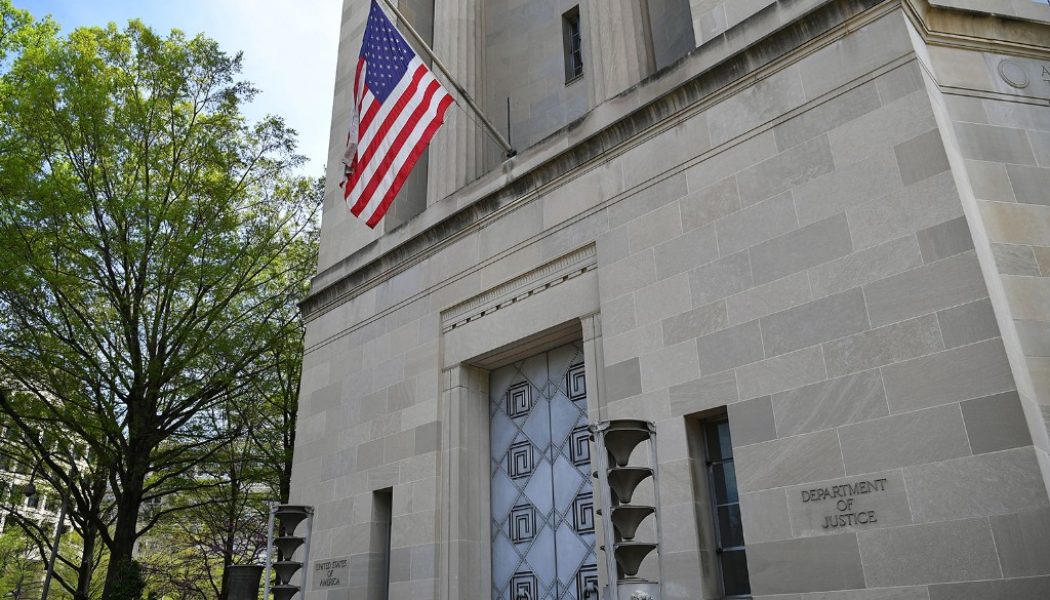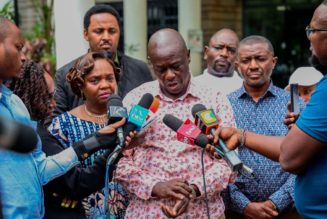
Pharrell Williams, LeAnn Rimes, top executives from the performing rights organizations and other leading trade groups all spoke at Tuesday’s session.
At the top of Tuesday’s (July 28) Department of Justice public workshop regarding the federal consent decrees that govern ASCAP and BMI, assistant attorney general for the antitrust division Makan Delrahim laid out the main focus for the two-day hearings and panel discussions: competition. Or more specifically, as he put it, “Competition for the benefit of the American consumer, competition for the benefit of innovation and competition for the benefit of songwriters, composers and artists.”
That set the tone for four hours’ worth of discussion on the potential review, which was undertaken by the DOJ as part of its push to go over every consent decree governing American industry that has been in existence for more than a decade. (Delrahim’s department began the mission after he took office in 2017.) The ASCAP and BMI consent decrees — originally designed to rein in the power of the two largest performing rights organizations (PROs) in their negotiations with music users (at the time, specifically terrestrial radio) — were initially put in place in 1941, and this public workshop, which will continue Wednesday, was set up so that stakeholders from all sides could offer commentary as to whether the decrees should be altered, terminated, replaced or simply left alone.
At issue is whether two 80-year-old antitrust decrees are still useful in an industry that has been completely transformed by digital innovation time and again over the decades. Most recently, the streaming model has overtaken sales as the dominant driver of revenue in a music business that increasingly sees its music used in more significant ways by massive tech giants like Amazon, Apple, Google and Spotify, rather than broadcast in bars and restaurants, over the airwaves and, in the current pandemic, in live settings.
“In the age of streaming, songwriters no longer make money through record sales,” said LeAnn Rimes, who spoke right after Delrahim. She also sang the chorus of her Diane Warren-penned hit “How Do I Live” and noted that for many songwriters, performance rights are their largest source of income, especially now. “It doesn’t take a lawyer to see that these laws have not kept pace with how dramatically the music industry has changed since 1941,” she said.
Across three sessions, representatives from various stakeholder organizations discussed different types of licenses on offer from the various PROs, how they affect industries like television and radio beyond just the songwriters, composers and publishers. They also explored whether changes to the two decrees — which differ in slight but sometimes significant ways — would affect competition at the expense of writers and publishers, and the possible ramifications in the marketplace. (A recording of the proceedings can be found on the division’s website.)
The first session allowed many of the biggest stakeholders — top executives from ASCAP and BMI, as well as the National Music Publishers’ Association (NMPA), Songwriters of North America (SoNA) and the National Association of Broadcasters (NAB) — to lay out their respective positions succinctly.
ASCAP CEO Elizabeth Matthews went first, emphasizing the often-unknown but no less important nature of songwriters and composers — “The unsung heroes behind American music,” as she put it — who are often dependent on PROs if they do not have health insurance or salaried income. And she was the first of several to point out how the conditions surrounding the consent decrees have changed, though the decrees themselves have substantially not, with competition from other PROs (namely SESAC and Global Music Rights, though there are others) and a boom in licensees naturally reducing the antitrust concerns with ASCAP and BMI, while the setup currently serves to protect the towering tech giants from the collective strength of songwriters and composers. (“It is crazy to think that in 2020, songwriters are more regulated than Facebook,” she delivered.) The decrees are “wildly outdated and need to be harmonized and simplified,” she said, emphasizing that they ask the decrees to be modernized, rather than immediately terminated, in order to “put all stakeholders on a pathway to an eventual free market.”
“We compete fiercely like Pepsi and Coke, so you may think it’s a little strange for us to come together,” she said of ASCAP and BMI, adding, “but this requires industry-wide cooperation…. Please do not leave songwriters, composers and lyricists back in 1941.”
NMPA president/CEO David Israelite followed, saying this was “the most important issue facing songwriters today.” Israelite, too, noted that the way the decrees currently are interpreted they serve largely “to protect digital giants” like Amazon, Google and Apple — the opposite of their original intent — using that point to emphasize the need for selective withdrawal for publishers and songwriters, allowing them to choose whether to license to digital service providers through their PROs or to negotiate directly. Without that ability, songwriters and publishers are left with an all or nothing option — one which should not be mutually exclusive, with the “prohibition on selective withdrawal not rooted in copyright law or in antitrust law.”
He also pointed out that on Wednesday, the leaders of several tech giants — including Amazon’s Jeff Bezos, Facebook’s Mark Zuckerberg, Apple’s Tim Cook and Google’s Sundar Pichai — will appear before Congress to answer antitrust questions regarding their digital dominance, with each company benefiting from the consent decrees’ restraint of ASCAP and BMI. “Pause for a moment and think about that. Due to the unintended consequences of consent decrees that never end, the giant technology companies that will be under Congressional scrutiny tomorrow are being protected from songwriters,” he said. “These companies are nothing like the fledgling broadcast industry of the 1940s, yet they benefit from the same protections.”
SoNA executive director Michelle Lewis, a songwriter in her own right, appealed to the human side of the discussion, saying, “As a songwriter, our songs are all we have…. There are human songwriters and composers that have to live with these decisions.” She then explained the road traveled the last time the antitrust division took up the consent decrees, in 2016, which resulted in a ruling by the DOJ in favor of 100% licensing — which SoNA, among other groups, then successfully sued to overturn. Lewis said that SoNA supported ASCAP and BMI’s proposal to streamline decrees, but urged they keep songwriters in the conversation. “Whatever you do, please remember the creators,” she said. “Without songwriters, there’s no music, and without music, there’s no music business. If you want to protect the music business, I implore you to protect the songwriter.”
Gordon Smith, president/CEO of NAB and former U.S. Senator from Oregon, then pointed out that this is the second time the DOJ has looked into the decrees in the past five years, and had ultimately left them alone in the prior instance — and that any changes this time around would likely lead to unintended consequences, harm licensees and consumers and stifle competition. The NAB was a big proponent of 100% licensing, and still is, and it was the first of three critical issues Gordon raised that he urged the DOJ to address. The others were a perceived lack of transparency on the part of the PROs and that the other two major PROs — SESAC and GMR — should also be brought under the decrees in order to protect radio broadcasters and other licensees. He urged the DOJ to follow the process that led to the Music Modernization Act, getting Congress involved in legislation and bringing in all stakeholders, including the other PROs, in order to develop an “alternative framework,” if any change to the consent decrees were to be on the table.
Finally, BMI’s president/CEO Michael O’Neill came in to echo many of the points that Matthews made, while laying out slightly more detail in terms of what each of the two PROs was proposing. (O’Neill’s pull quote, in pointing out the increasing competition in the PRO space: “It’s kind of like the new yacht — everybody wants it.”) He noted that ASCAP and BMI had not asked for this review, and is not asking for immediate termination of the decrees, but is hopeful that the new decrees they are proposing could prevent “chaos” in the marketplace while also including a sunset clause, paving the way for their eventual dissolution. “It would create a more productive, efficient and level playing field for everyone,” he said of that possible eventuality, “but we also recognize that change is hard.”
O’Neill then outlined four key provisions from the existing consent decrees ASCAP and BMI would like to see changed: to allow all licensees immediate access to their repertoires provided they begin immediately paying; to retain the court process that is currently in place if disputes arise; to reserve a system allowing for direct deals; and keep the current form of licenses on offer, while allowing ASCAP and BMI to offer new types of licenses in order to adapt to the marketplace. Such provisions would “support the future,” O’Neill said. “We all believe that competition is beneficial and necessary. We want to see change and we want to do it in the right way that makes sense for everyone. I’m confident we can find a path forward.”
Later in the afternoon, Pharrell Williams made an appearance in another short keynote speech, also echoing the common refrain that protecting songwriters is the proper way forward — and, reflecting on the current situation in this country, saying that now was the appropriate time to do it. “There are plenty of parents out there that would argue that the world needs more lawyers and doctors. But let me make the case for more songwriters,” he said, later concluding, “Think of us as just like anyone else who has a career. Our lives depend on it. Their lives depend on it. It’s the right thing to do…. The people need songs to sing, and those are written by songwriters. Let’s protect them too.”










